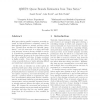JSSPP
2007
Springer
15 years 8 months ago
2007
Springer
The number of distributed high performance computing architectures has increased exponentially these last years. Thus, systems composed by several computational resources provided ...
JSSPP
2007
Springer
15 years 8 months ago
2007
Springer
Abstract. The workshop on job scheduling strategies for parallel processing (JSSPP) studies the myriad aspects of managing resources on parallel and distributed computers. These st...
JSSPP
2007
Springer
15 years 8 months ago
2007
Springer
Current resource managers do not have adequate node allocation and distribution strategies to efficiently schedule jobs on multi-core multi-threaded systems. Clusters composed of ...
JSSPP
2007
Springer
15 years 8 months ago
2007
Springer
Performance evaluation in multi-cluster processor co-allocation - like in many other parallel job scheduling problems- is mostly done by computing the average metric value for the ...
146
click to vote
JSSPP
2007
Springer
15 years 8 months ago
2007
Springer
Most space-sharing parallel computers presently operated by high-performance computing centers use batch-queuing systems to manage processor allocation. Because these machines are...
128
click to vote
JSSPP
2007
Springer
15 years 8 months ago
2007
Springer
The TeraGrid is a closely linked community of diverse resources: computational, data, and experimental, e.g., the imminent very large computational system at the University of Tex...
JSSPP
2007
Springer
15 years 8 months ago
2007
Springer
112
click to vote
JSSPP
2007
Springer
15 years 8 months ago
2007
Springer
Heterogeneous clusters and grid infrastructures are becoming increasingly popular. In these computing infrastructures, machines have different resources, including memory sizes, d...
JSSPP
2007
Springer
15 years 8 months ago
2007
Springer
Abstract. This paper empirically explores the advantages of the collaboration between different parallel compute sites in a decentralized grid scenario. To this end, we assume ind...




